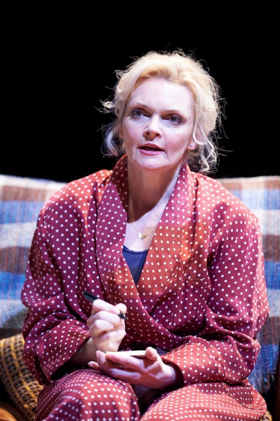Interview: Sharon Small Talks STILL ALICE On UK Tour

Sharon Small's work includes The Inspector Lynley Mysteries, Mistresses and Trust Me on screen, and Carmen Disruption and The Threepenny Opera on stage.
She's currently starring in Still Alice, which began its national tour at Sheffield Lyceum last night.
What is the play about?
It's about a woman, a Harvard linguistics professor, who, around her 50th birthday, realises that things aren't quite right and she is diagnosed with young onset Alzheimer's. It's about her coping with that really, how she manages it. Being such a bright woman, she tries to hold on to things that keep her cognitive.
It's about how it starts to affect her family, as she realises she does not have as much control over it as she would normally, in what she imagined would be everyday life. As the illness progresses, the play looks at the price it exacts on a person and their family, as they become less able.
There's a huge amount of stages in that deterioration - with it being young onset dementia, these people are still working and they're written off too early when they can still cope, still work. Their parameters might have to change - maybe they have to spend time working from home and have set times when they might be found or to deal with things. Quite often, they're just told to take their pension package and leave.
I remember seeing a film of a man who said that he was getting to the stage of the illness where it was easier for him because he wouldn't remember, but over time, there had been a lot of stages and coping with the changes that had occured. The cognitive decline can take years - it's quite aggressive when it's young, but it can still be four to six years or even longer in progression.
What reaction have you had from people dealing with the impact of Alzheimer's?
Our first performance at West Yorkshire Playhouse was as part of the Dementia Festival, so we were very involved with dementia organisations and the production itself was staged "dementia-friendly". When they saw it, they were really informative about how much they needed to be seen as coping with dementia, making that a positive aspect of their lives. It was a message that they wanted to see sent into the world. Everyone we came across was of that mindset.
At the dementia-friendly performances we did, people came up to me and said, "I have dementia and I loved that, though I'm not going to remember it tomorrow. It was so important to me - I was with you all the way, as I have failed this test and that test."
I've had other instances where it's been partners, spouses, sisters come up and say that they'd wished that they had seen it years ago so that they would know what was coming. They added that even though it was heartbreaking to see, it was moving to watch and be part of. It seemed to be a positive and moving experience for a lot of people with direct experience of the disease.
On of the devices we use in the play that isn't in the film is a character called "Herself", who is onstage all the time and is the voice in my head. So even though people around me may think that I've "left" or I'm "having a moment", my brain is still raging saying "I still remember!" and "I'm going to be an experiment!" - though you wouldn't know that just looking at Alice.
That seems to fit with quite a lot of people who experience it. They still have a very conscious mind, but it's not coming to the fore when they need it.
What is a "dementia-friendly performance"?
It's set up specifically for people who are living with dementia and their families. We bring the lights up in the house, so if anyone becomes disoriented or upset, then they can leave whenever they want. As a company, we are prepared for anything to happen - but, in fact, everyone was fantastically on board for those six performances. We're doing another dementia-friendly performance in Richmond and at other venues that have a relationship with the dementia community.
Do you feel that theatre has any responsibility to highlight emerging social or medical issues?
That's one of the reasons why I'm doing the play. It was very clear that this was touching people because it's a disease that crosses all divides. You do it because it reflects life - it reminded me of why I act.
I don't think the piece "teaches" about dementia - it's more a snapshot of a particular woman, but, by the very nature of it, anyone who has an interest in the subject or just wants a really good night out at the theatre will enjoy it. It's informative, moving and dramatic - not without the key message that "I'm still in here: please don't write me off."
I enjoy pieces that politically motivate me or make me think or move me, because it is a more and more prevalent disease - especially in the earlier years of life.
What are your views on some recent casting controversies concerning roles that feature a disability or specific characteristic going to stereotypical white, middle-class drama school graduates?
Oh gosh - those arguments are all over the place in lots of different ways. Ultimately, as a performer, you want to try and work and you feel that you could have a go at doing anything. But you have to take in that we have a much more diverse acting community, so if there is someone who is right for that job and will tell the story better, then I absolutely applaud that.
We've been fighting these fights over the years in terms of female parts firstly, then older women, then people of colour and now disabilities. I'm sure that, as we keep progressing, we will become way (hopefully) more inclusive. I know some fantastic disabled actors who can do an amazing job.
I don't feel very bitter about that. I'm a working-class person, part of the 19% of actors who make a living who are - and a woman on top of that, so that reduces the percentage still further.
I don't think that you should downright say that a person "cannot play it".
How has the role changed since you first played it at West Yorkshire Playhouse?
We only played it for two and a half weeks, so there's much more to be mined from it. We've got a largely new cast and with that comes new energies, a different interpretation - it's really exciting actually.
It'll be your first time touring for some time, so what does that feel like?
I'll tell you in about six weeks' time! I haven't organised anywhere to stay yet - I need to sort that out. It'll be interesting, but I'll miss my family, I'll miss my children a lot.
I think this is a play that will speak to communities in different areas, so I'm looking forward to that response.
When I first toured in my twenties, I partied a lot! This time I'll engage with the local cultures - galleries etc - because now I'm grown up. You just can't burn the candle at both ends any more.
What are the specific challenges of working on a piece that started life as a novel, was made into a film and is now in its third life as a play?
There are the classic questions - how do you follow that? All we can do is to try to stay true to the piece that you have. All of the key story aspects are there.
We include the character "Herself", which is more dramatic, where in the film you can jump cut and allow the audience to imagine what's going on in the character's head with close-ups to help.
The story is strong enough and the momentum of the play builds over 23 scenes - snapshots of the progression of this woman's life. It's movingly, and beautifully, told.
I know some people might say, "She's not Julianne Moore", but I can only do what I can do on a stage and hopefully bring new things to the role.
It is a different kind of suspension of disbelief. We explore parts of the anger and the explosive side of dementia that you can go for in theatre.
What are the key differences (if any) in acting for television, for film and for the stage?
I'm sure you've heard this before, but, ultimately, if you're telling the truth, it all comes from the same standpoint. It's then a case of how big you translate that. If you have a camera right In Your Face, you only have to "think it" and, hopefully, it's been translated.
You can't just "think it" on stage - you need to tell it a bit more and feel it in a more magnified way. Your audience is then as included as they would be if they had a massive close-up. It's about inclusivity probably.
The money isn't much different these days!
What's next after the tour?
Nothing! I've just stepped off a cop drama for Acorn TV. It's their first commission and it's a pop-up murder investigation team in which I play a sassy, belligerent detective. It was ten weeks in which we shot ten hours of television.
I'll be quite happy to take a breather and see what happens.
Find full dates and venues for the Still Alice tour here
Photo Geraint Lewis
Videos
